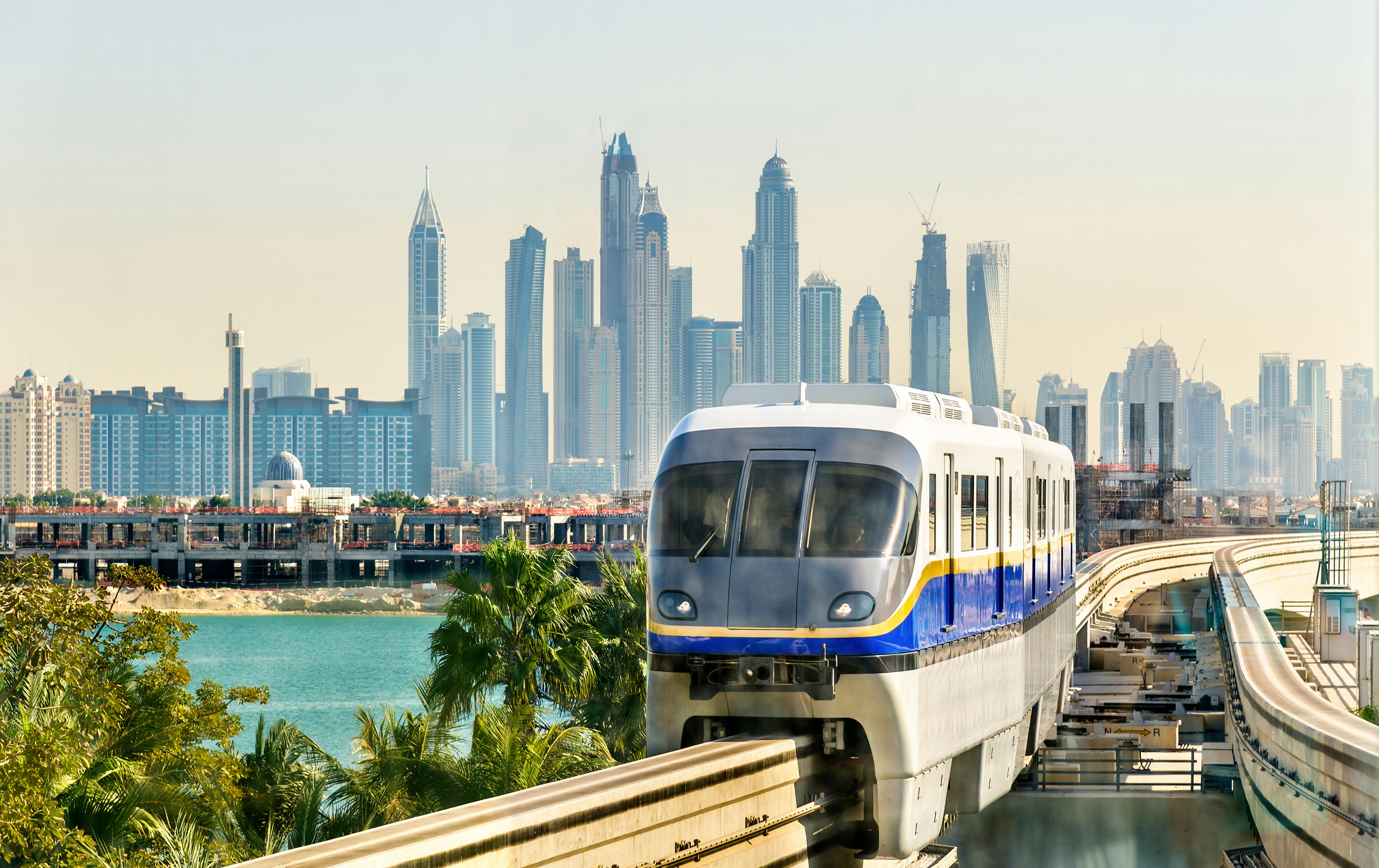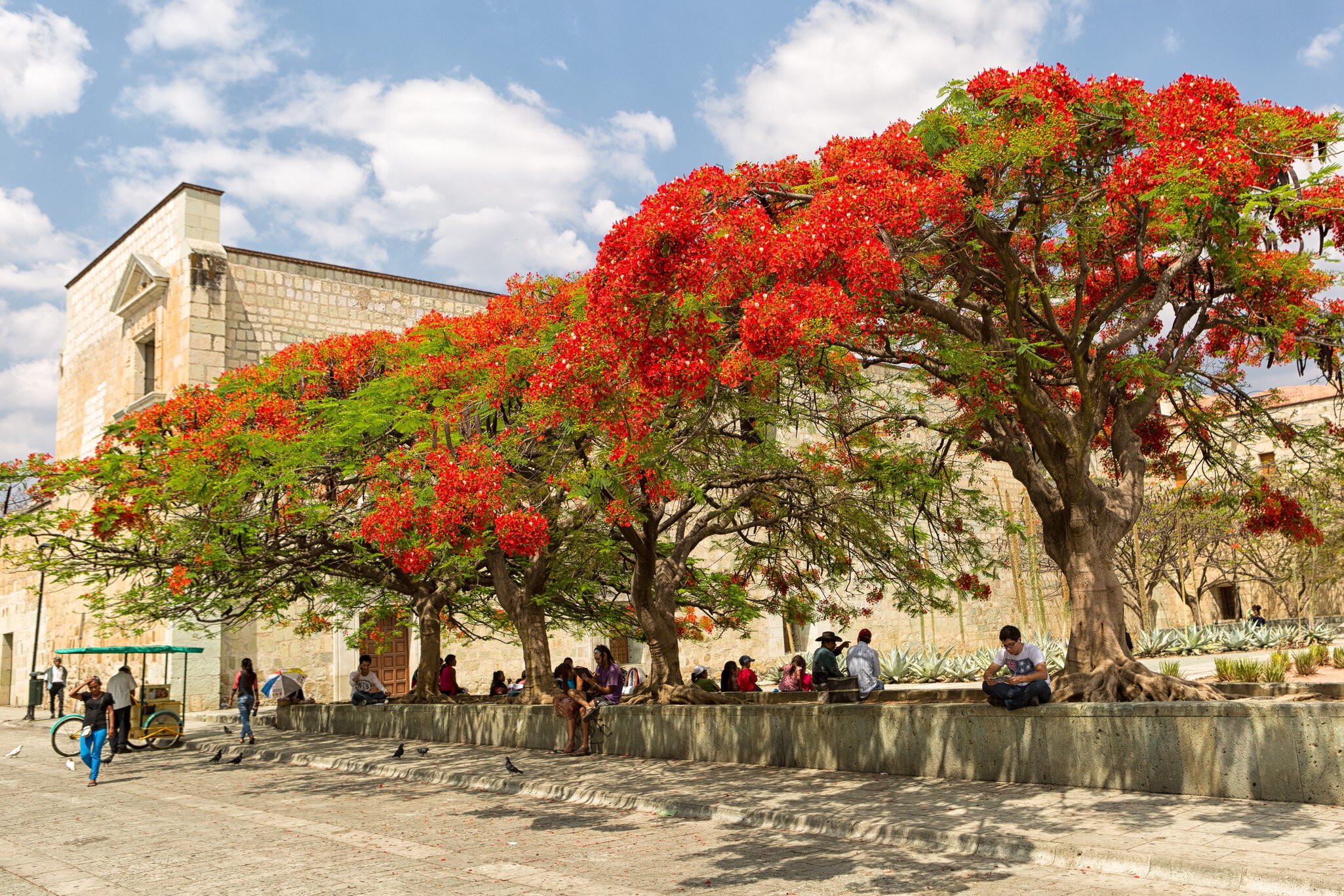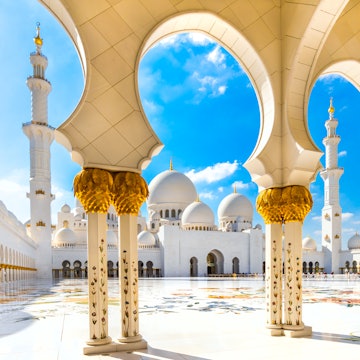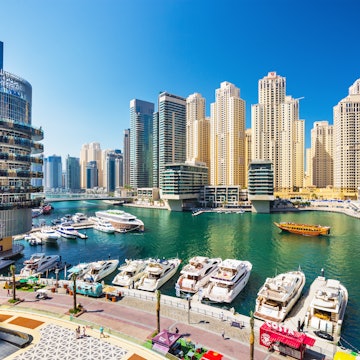

One of the most striking buildings in Dubai: the Museum of the Future is on Sheikh Zayed Rd © Karim Sahib /AFP / Getty Images
Famous for its record-breaking skyscrapers, five-star hotels, hedonistic beach clubs and mega malls, Dubai combines these elements to create the perfect setting for a glamorous coastal city break. Serious shoppers, sun worshippers and those thirsty for a taste of the champagne lifestyle are among its regular visitors. Dubai is also a magnet for families with its abundance of kid-friendly activities, including a thrilling selection of theme parks.
Beyond the big-ticket attractions there’s a burgeoning art scene; a vast desert playground ripe for 4x4 dune-bashing adventures, camping trips and camel treks; and the historic district lining atmospheric Dubai Creek. Being ferried across its waters in a traditional abra boat is one of the most nostalgic experiences a traveler can have in the emirate.
Dubai’s wellness scene is also thriving, supported by world-class spas, cutting-edge longevity clinics and an impressive selection of fitness facilities from Instagram-worthy padel courts to zen yoga studios. With more than 10km of glorious golden coastline lined with promenades and boardwalks, clocking up 10,000 steps a day is easy – and, of course, the water sports on offer run the gamut from stand-up paddle boarding to windsurfing. Visit in November, and you’ll find yourself in the throes of the 30-day Dubai Fitness Challenge in which residents and holidaymakers come together to take part in a daily programme of runs, walks, bike rides and exercises classes.

When to go to Dubai
With year-round sunshine, Dubai’s peak season runs from November to April. Come May, temperatures begin to climb. By July and August, intense heat keeps visitors indoors – but it doesn’t keep them away. A lot of Dubai’s tourist pursuits are weatherproof, from its temperature-controlled swimming pools and air-conditioned retail and entertainment emporiums to its most famous landmark, the world’s tallest building, Burj Khalifa. There’s even an indoor snow park, Ski Dubai, where you can really chill out. And, of course, the greatest allure for tourists in the summer months is the cost: hotels and attractions drop their prices making Dubai more affordable than at any other time of year, while Dubai Summer Surprises (DSS) sees shops offering substantial discounts.
How much time should I spend in Dubai?
Jetsetters might drop in for a long weekend of retail therapy and partying, but most leisure travellers come to Dubai for a classic one- or two-week beach holiday. First-timers hoping to see a broader range of what the emirate has to offer should aim to spend a couple of days by the coast, another two in and around Downtown Dubai, plus a day or two in the desert, and – in the cooler months – a day exploring Old Dubai.

Is it easy to get in and around Dubai?
Dubai International is the emirate’s main airport and most neighborhoods are within a 20- to 45-minute drive. Taxis are the easiest way to get around. Dubai’s Roads & Transport Authority (RTA) taxis can be hailed in the street or booked via Dubai’s Careem app, and they gather at ranks outside of the airport, and at hotels, attractions and malls. Uber is also available, but it’s generally more expensive with prices rising steeply during busy periods.
Dubai’s public transport network includes a metro, a tram, a monorail, buses and some boats. Dubai Metro is the most efficient mode of transport and has two overground lines (both good for sightseeing outside of rush hours). The longer Red Line spans the length of Dubai from Jebel Ali and Expo City Dubai to Al Rashidiya with stops at the airport’s Terminal 1 and Terminal 3.
The Green Line runs from Dubai Creek in Al Jaddaf to Al Nahda Street across the water. A cause for confusion: some stations are named after companies rather than their locations. For example, the Al Nahda Street station is called Etisalat by e& (the name of a local telecoms company), so the uninitiated may need to read a map and cross-reference destinations when planning metro journeys.
Dubai Tram follows a short circuit around Dubai Marina from Al Sufouh, while Palm Jumeirah is served by a monorail running up and down the trunk. RTA also operates marine transport with a network of abra boats criss-crossing Dubai Creek. Abra boat rides are the most fun and affordable modes of transport at just AED2 per trip. Metro and tram tickets cost from AED4 for a standard ticket, crossing one zone. A single Palm Monorail ticket costs AED10 for one stop.

Top 5 things to do in Dubai
Hatta Mountains
Take a cab to the Hatta Mountains, around a 50-minute drive from central Dubai, and stride out on an early morning hike. Pose for a snapshot with the Hatta sign at the top before descending to Hatta Dam for a spot of kayaking.
Desert safari
Do a desert safari and tick off dune-bashing, falconry, henna tattoos, camel trekking and sandboarding from your Dubai to-do list all in one day.
Aquaventure
Brave the near-vertical drop of the Leap of Faith slide at Aquaventure, which sees riders shoot through a shark-filled tank just for fun.
On the water
Take a boat trip or stand-up paddle board your way along the Arabian Gulf coast in the shadow of the “seven-star” Jumeirah Burj Al Arab hotel.
Art galleries
Attend an art festival at Alserkal Avenue, exploring the industrial estate-turned-cultural-hub’s galleries and concept stores, before pulling up a sofa at Cinema Akil to watch an arthouse film with a steaming cup of chai latte.
My favorite thing to do in Dubai
I live for sunsets strolls along the banks of Dubai Creek, camel’s milk ice cream in hand, exploring the famous souqs, and when the mood takes me, I switch sides by abra boat. The crossings are dreamy.
How much money do I need for Dubai?
Dubai is a tale of two cities; one is eye-wateringly expensive, the other is extremely affordable.
In peak season (winter), you can spend the equivalent of a mortgage down payment on a penthouse or villa at one of the five-star-plus hotels, such as Jumeirah Burj Al Arab or Bulgari Dubai – or you can economize.
Though it isn’t a hostel town, Dubai has outstanding three- and four-star hotels. Rove is one of the most popular chains. These photogenic retreats have outdoor pools, gyms, laundrettes and luggage stores. Staying the first week in July, the cheapest month of the year alongside August, will typically cost less than AED2,000 (US$545) for six nights for a basic room for two.
There’s also been an increase in the number of short-term holiday rentals, such as AirBnB, with costs in summer averaging around AED500 ($135) a night for a one-bedroom apartment in a central location. Prices tend to rise the closer you get to the beach.
A coffee will set you back around AED20 (US$5.50), while a wine costs from around AED50 (US$13.50) a glass.

How can you make your money go further?
For experiential dining on a budget, head to Dubai’s older quarters to sample Indian, Pakistani, Iranian, Iraqi, Syrian and Filipino food cooked up by the lineage of families who first settled here who are now carving a living serving hand-me-down recipes. Ravi’s – of Pakistani origin – is the most famous. Adidas recently collaborated with the restaurant on a limited-edition Superstar Ravi tennis shoe. It caused a stir in fashion circles, but the chain remained true to its humble roots and didn’t miss a service.
Free and fabulous attractions include the Dubai Fountain show, which typically runs every 30 minutes at the foot of the sparkling Burj Khalifa from around 6pm to 11.30pm, with hit songs, laser beams and water jets choreographed by WET, the team behind Las Vegas’ landmark Bellagio fountain.
Other gratis goodies include Dubai’s portfolio of art exhibitions from the avante garde galleries at Alserkal Avenue to the contemporary Jameel Arts Centre on Al Jaddaf Waterfront.
In addition, there are miles of silky-sand public beaches, soft, deep and safe with night swimming now an option on specially lit stretches at Umm Suqeim 1, Jumeirah 1 and Jumeirah 2. By day, head to Jumeirah’s Kite Beach to join the local community savoring scenic strolls, frisbee games and kite flying.
Finally (sorry guys, this one’s not for you), women can attend one of Dubai’s many ladies’ nights for free drinks. You get two to three free drinks, or more, at various bars across the city simply by virtue of being female. Historically, ladies’ night took place on Tuesday, but now they span the week. Google “Dubai ladies’ nights listings” to find the nearest one.

Top local tips
Respect the local culture
Bikinis are fine on the beach, but not in shopping malls. Don’t swear or use rude hand gestures in public either – it’s considered to be even more offensive than walking around H&M in a G-string.
Don’t drink alcohol in public
Consuming alcohol is permitted in designated areas, such as bars, restaurants and your own private accommodation – but don’t drink in the streets or on public beaches. These are family-friendly zones.
Don’t photograph anyone without their consent
It’s illegal to take and publish images of people without their knowledge and consent.
Don’t eat or drink on the metro
It’s strictly prohibited and you may even be fined if you’re spotted by officials.













